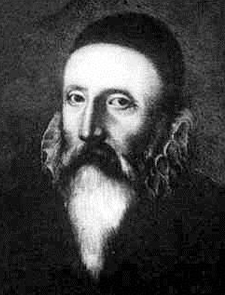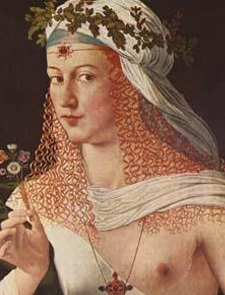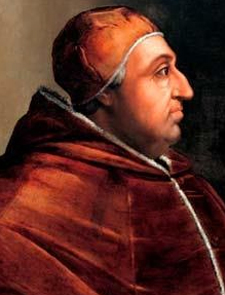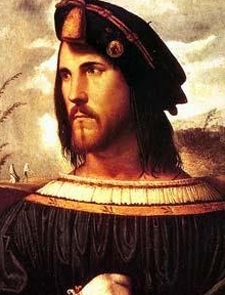John Dee

John Dee (1527-1609) and Edward Kelley developed a language, supposedly dictated by angels during their scrying sessions. Named after Enoch, the Biblical figure who 'walked with God', the Enochian system is said to be the tongue of the angels, and capable of controlling them. It has become the basis of many occult rituals and activities.
Below is Dees' Seal the Sigilum Aemeth (The Seal of God; TRUTH)
For many years Dee attempted to contact angels and learn what he could not find in his scientific studies (he had been arrested for studying mathematics which was considered to be a dark magic). Dee recorded the results of his scrying:

'John Dee, I am Raphael, one of the blessed and elect Angels of the Almighty; and at his will and his good pleasure, he hath commanded me to appear here at this time, to set forth the will and pleasure of the Almighty God. So if thou wilt do as God shall command thee by this message, thou shalt have all these messages, promises and wisdom, both for the Philosopher's Stone, the book of St Dunstan, the secret wisdom of that Jewel that was delivered, as thou knowest, in what manner it is plainly known unto thee.'
From John Dee's journal of angel experiments, 10-11 July 1587
Dees' obsession was however never to be entirely satisfied. The angels had not yet delivered the final key to the Enochian language, but in April 1587 they made a disturbing demand. Kelley told Dee they were required to swap wives, a sin that would damn both their souls to hell. Remembering Abraham sacrificing his son for God, Dee agreed. His wife Jane, who despised Kelley, was unhappy with the idea, and even more so when she became pregnant. Wife-swapping also changed the relationship of the men, and in 1589 they finally parted company when Dee and his family returned to England.
Lucrezia Borgia

There is no force quite so potent as a woman with infamy and corruption infused indelibly into her blood.
Born in 1480 to the wickedly debased Renaissance Pope Alexander VI and his mistress, Vanozza de Catanei, perhaps it was no surprise that Lucrezia Borgia would go on to become the very definition of a duplicitous, seductive and ultimately lethal femme fatale. Irresistible to men and deft with her womanly wiles to bring about their downfall, Lucrezia stopped at nothing to exact her father’s will; executing political bribes throughout Rome and the Vatican City by any means, as well as more extreme solutions.
Portrait of a Woman: Bartolomeo Veneto considered to be a painting of Lucrezia Borgia

Any prince or official identified by her father as threatening the family’s status was hollow knop of a golden goblet, to cunningly secrete into her hapless victim’s cup.
Accompanied by her equally ruthless brother, Cesare, they formed a most unholy trinity that threatened to bring down the Catholic church from within.
Divine Corruption: Pope Alexander VI
Corridoio Vasariano, Florence

Before she had even reached her teenage years, Lucrezia’s father had arranged and broken off many important and politically influential marriages for her – including one to Giovanni Sforza, who acted as a spy against the Borgias and fueled accusations that haunted the family for years to come – not least rumors of paternal and fraternal incest between the Pope and his children that ran rampant; a scandal that was hardly quieted when Lucrezia and her brother appeared side by side upon a balcony as Cesare cruelly shot unarmed criminals with his crossbow for amusement.
Cesare Borgia: Altobello Melone
Accademia Carrara
Illegitimate children and unhappy betrothals seemed par for the course as Lucrezia grew older, and Cesare’s jealousy of her partners was heated at best, and extremely violent at worst; her second husband, Alfonso of Aragon, was strangled to death by mutual agreement after Pope Alexander could no longer find a bureaucratic use for their union.
Despite eventually being married a third time to Alfonso d’Este and indulging in the respectable life of a Renaissance duchess, Lucrezia’s appetite remained unsated, her boredom unfulfilled, and she began an extra-marital affair with both her brother-in-law and the poet Pietro Bembo.
In 1519, at the age of 39 and after experiencing complications with giving birth to her eighth child, Lucrezia Borgia, herself, succumbed to death – though she had already long outlived the contaminated, blood-stained legacy that her father laid down before his own horrific end, being accidentally poisoned by his own son. In a letter to Pope Leo X written only the night before her demise, Lucrezia articulated her desire for death; her readiness and the peace she had found with herself.
No doubt she is still most notoriously remembered as a heartless, depraved woman bent on gratification and driven by her father’s wishes, and most certainly a truly murderous Machiavellian mistress.



